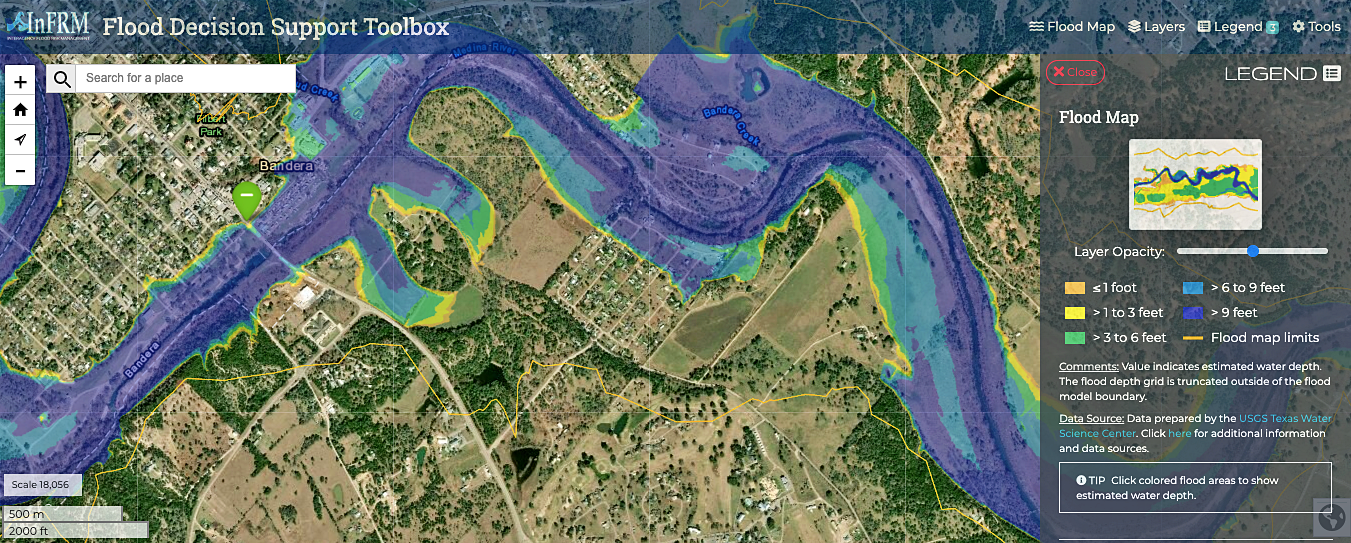February 14, 2020
Interactive Flood Risk Management system training planned
By Jessica Nohealapa'ahi Goode
The Bandera Prophet
Bandera County River Authority and Groundwater District General Manager Dave Mauk introduced InFRM - Interactive Flood Risk Management - to Bandera City Council members.
“We are flash flood alley,” Mauk said, adding Bandera County is rated the second highest flash flood location, behind the Himalayas.
He said InFRM is a living model, in which the U.S. Geological Survey inputs rainfall and flooding to recreate hypothetical flood events.
“Anyone can go on the website and manipulate the study area,” Mauk said. “This is a powerful tool that you all can use. It’s going to save lives. It’s going to save property too.”
Mauk said the state-of-the-art model will eventually predict water travel times, to better prepare emergency planners downstream.
“The county, the feds, the state, the municipality, the county and a political subdivision are all working together on this. A lot of people are looking at it,” Mauk said. “If you want to sit around and see what happens when armageddon comes, you can put it in and this will show you. It’s dry right now, but it’ll come. It’ll come.”
The InFRM group will provide an in-depth public training session at 2 p.m., on Feb. 26, at the Bandera Electric Cooperative meeting room. The public is invited.
EDC moratorium lifted
After an expected deliberation and debate, Bandera City Council members approved the expiration of a moratorium placed on future spending by the city’s Economic Development Corporation. Specifically, the council took no action on the moratorium, which expired Feb. 10.
The initial action was placed 60 days ago, halting all spending not already approved and budgeted for. Asking for a workshop to further discuss how the city would like to move forward with incentives, Council Member Lynn Palmer motioned to extend the moratorium for up to another 60 days. Council Member Jerry Russe seconded the motion.
“I think we need to let them self-govern. We did have a workshop that has been somewhat productive. Things are on the move now in the right direction,” Council Member Rebeca Gibson said. “Letting business carry on for economic development is critical. We set it at 60 days and I think we need to let things move on.”
Russe said close to a half-million dollars has been given to businesses, and the city has infrastructure needs such as roads and a new water treatment plant.
“Either we spend our money more conservatively and wisely, or we raise taxes,” Russe said. “Not one thing has been accomplished since we set the moratorium.”
Calling a point of order, Council Member Glenn Clark said the discussion should be about lifting the moratorium, not discussing particular items that the EDC has done.
“The point of this agenda item is not to give the history of the council or the EDC,” Clark said. “This is not the time or the place for this discussion.”
Council evaluates City Administrator
Choosing his evaluation be conducted in open session rather than closed, City Administrator J. Horry, who started his career with the city in May of 2018, answered a firing squad of questions from council members.
Concerned about imbalanced and preferential code enforcement, Clark asked about apparent inconsistencies.
“I’m all about equal enforcement,” Clark said. “I don’t think that’s always the case.”
Palmer said she wanted to see abandoned residences, that have been boarded up and not occupied for years throughout the city addressed.
Gibson asked Horry about a letter of recommendation he wrote to the Bandera County Central Appraisal District. She said she had an issue with his supporting the district while the chief appraiser is under investigation.
“We work a lot with the CAD. They have been very helpful to us,” Horry said, who added he had written letters of recommendation to numerous other agencies in the county.
Palmer said the city administrator has the authority to write letters of recommendation, however Gibson said such letters should have council oversight.
“I read the letter, and it sounded like an appreciation letter, which we encourage,” Russe said. “I’ve spent many hours sitting with J. discussing issues and my attitude has changed. I think you’ve done a great job since I’ve been working with you. I can see you’re working hard.”
City Marshal Will Dietrich said speaking as the longest tenured city employee, morale is 100 times better at City Hall than he’d ever seen it.
“He comes and talks to me when there’s a problem or concern,” Dietrich said. “I talk to him when I have a concern. I’ve had city managers I couldn’t talk to.”
Mayor Suzanne Schauman said she has worked well with Horry.
“He’s done a wonderful job,” Schauman said, adding she would like to see more communication regarding details on what has been addressed with city employees.
Water lines located
In other business, City of Bandera Public Works Director Martin Parks reported the Hwy. 172 lift station repair project was completed. He recommended the city consider purchasing a Ditchwitch - an underground utility construction trencher.
He said he found 450 feet of water line that had been installed but never used. Public Works rented the equipment and completed in 10 days what would have taken two months to dig by hand.
“That machine helped us tremendously,” Parks said.
The equipment is estimated to cost about $50,000 to $60,000, versus $1,890 per week to rent. Parks said he was able to accomplish a lot, including locating four water lines on Galveston Street that weren’t documented.
“There are things in there we’ve never seen. It’s tough to go exploring by hand,” Parks said. “It would pay off for a small crew like us.”
“We are flash flood alley,” Mauk said, adding Bandera County is rated the second highest flash flood location, behind the Himalayas.
He said InFRM is a living model, in which the U.S. Geological Survey inputs rainfall and flooding to recreate hypothetical flood events.
“Anyone can go on the website and manipulate the study area,” Mauk said. “This is a powerful tool that you all can use. It’s going to save lives. It’s going to save property too.”
Mauk said the state-of-the-art model will eventually predict water travel times, to better prepare emergency planners downstream.
“The county, the feds, the state, the municipality, the county and a political subdivision are all working together on this. A lot of people are looking at it,” Mauk said. “If you want to sit around and see what happens when armageddon comes, you can put it in and this will show you. It’s dry right now, but it’ll come. It’ll come.”
The InFRM group will provide an in-depth public training session at 2 p.m., on Feb. 26, at the Bandera Electric Cooperative meeting room. The public is invited.
EDC moratorium lifted
After an expected deliberation and debate, Bandera City Council members approved the expiration of a moratorium placed on future spending by the city’s Economic Development Corporation. Specifically, the council took no action on the moratorium, which expired Feb. 10.
The initial action was placed 60 days ago, halting all spending not already approved and budgeted for. Asking for a workshop to further discuss how the city would like to move forward with incentives, Council Member Lynn Palmer motioned to extend the moratorium for up to another 60 days. Council Member Jerry Russe seconded the motion.
“I think we need to let them self-govern. We did have a workshop that has been somewhat productive. Things are on the move now in the right direction,” Council Member Rebeca Gibson said. “Letting business carry on for economic development is critical. We set it at 60 days and I think we need to let things move on.”
Russe said close to a half-million dollars has been given to businesses, and the city has infrastructure needs such as roads and a new water treatment plant.
“Either we spend our money more conservatively and wisely, or we raise taxes,” Russe said. “Not one thing has been accomplished since we set the moratorium.”
Calling a point of order, Council Member Glenn Clark said the discussion should be about lifting the moratorium, not discussing particular items that the EDC has done.
“The point of this agenda item is not to give the history of the council or the EDC,” Clark said. “This is not the time or the place for this discussion.”
Council evaluates City Administrator
Choosing his evaluation be conducted in open session rather than closed, City Administrator J. Horry, who started his career with the city in May of 2018, answered a firing squad of questions from council members.
Concerned about imbalanced and preferential code enforcement, Clark asked about apparent inconsistencies.
“I’m all about equal enforcement,” Clark said. “I don’t think that’s always the case.”
Palmer said she wanted to see abandoned residences, that have been boarded up and not occupied for years throughout the city addressed.
Gibson asked Horry about a letter of recommendation he wrote to the Bandera County Central Appraisal District. She said she had an issue with his supporting the district while the chief appraiser is under investigation.
“We work a lot with the CAD. They have been very helpful to us,” Horry said, who added he had written letters of recommendation to numerous other agencies in the county.
Palmer said the city administrator has the authority to write letters of recommendation, however Gibson said such letters should have council oversight.
“I read the letter, and it sounded like an appreciation letter, which we encourage,” Russe said. “I’ve spent many hours sitting with J. discussing issues and my attitude has changed. I think you’ve done a great job since I’ve been working with you. I can see you’re working hard.”
City Marshal Will Dietrich said speaking as the longest tenured city employee, morale is 100 times better at City Hall than he’d ever seen it.
“He comes and talks to me when there’s a problem or concern,” Dietrich said. “I talk to him when I have a concern. I’ve had city managers I couldn’t talk to.”
Mayor Suzanne Schauman said she has worked well with Horry.
“He’s done a wonderful job,” Schauman said, adding she would like to see more communication regarding details on what has been addressed with city employees.
Water lines located
In other business, City of Bandera Public Works Director Martin Parks reported the Hwy. 172 lift station repair project was completed. He recommended the city consider purchasing a Ditchwitch - an underground utility construction trencher.
He said he found 450 feet of water line that had been installed but never used. Public Works rented the equipment and completed in 10 days what would have taken two months to dig by hand.
“That machine helped us tremendously,” Parks said.
The equipment is estimated to cost about $50,000 to $60,000, versus $1,890 per week to rent. Parks said he was able to accomplish a lot, including locating four water lines on Galveston Street that weren’t documented.
“There are things in there we’ve never seen. It’s tough to go exploring by hand,” Parks said. “It would pay off for a small crew like us.”


